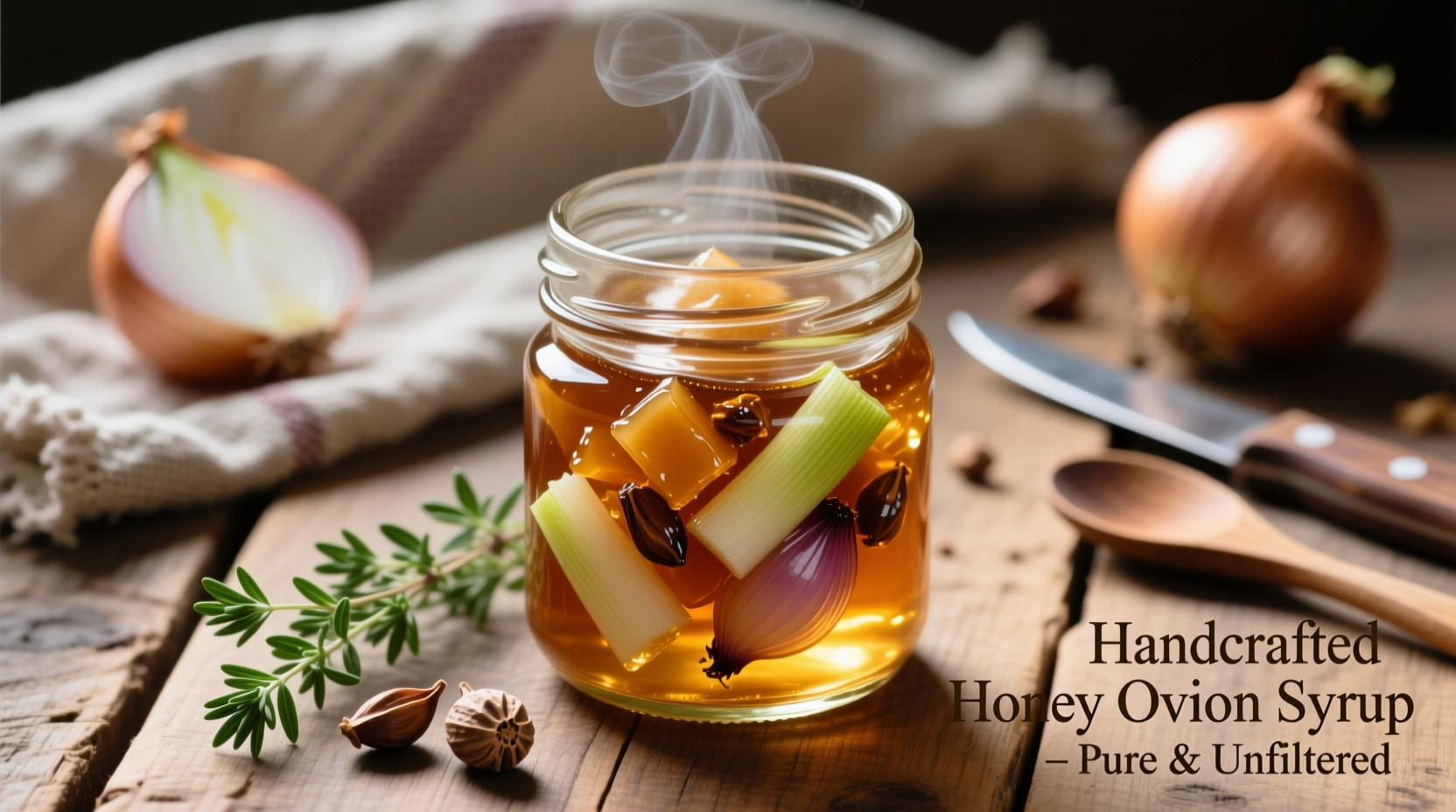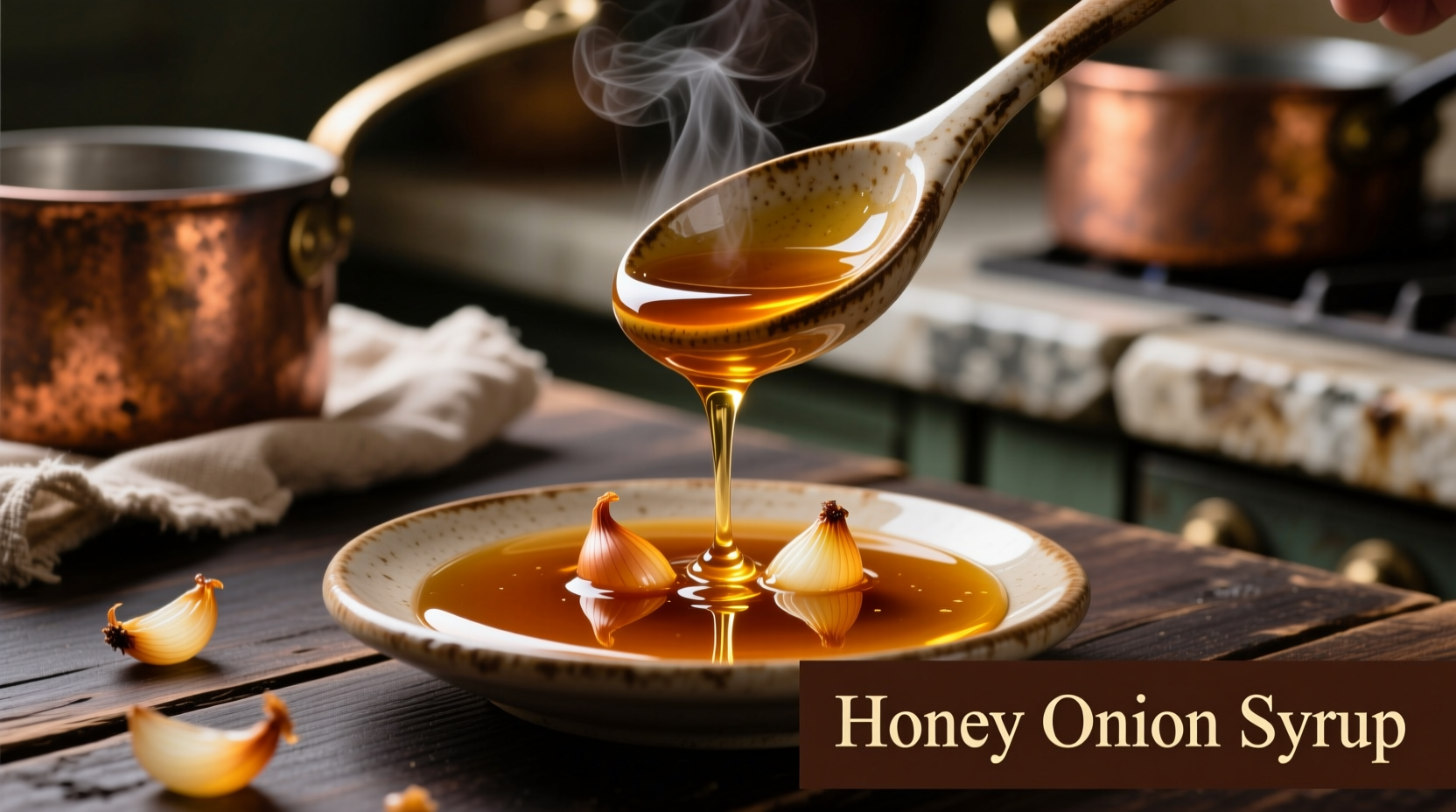When nighttime coughs keep you or your family awake, honey onion syrup offers a time-tested natural solution that's gaining scientific validation. This simple home remedy harnesses the powerful combination of raw honey and onions to soothe irritated throats and reduce cough frequency. Unlike many commercial cough medicines that contain questionable ingredients, this preparation uses just two kitchen staples with documented therapeutic properties.
The Science Behind Honey Onion Syrup
Onions contain quercetin, a natural flavonoid with anti-inflammatory and antioxidant properties that helps reduce throat irritation. When combined with raw honey—which has antimicrobial effects and forms a protective coating on mucous membranes—the mixture creates an effective cough suppressant. Research published in the Archives of Pediatrics & Adolescent Medicine demonstrated that honey reduced nighttime coughing more effectively than dextromethorphan, a common ingredient in cough medicines.

Historical Use Across Cultures
Honey and onions have been used together in traditional medicine systems worldwide for centuries. This natural remedy appears in European folk medicine dating back to the 18th century, features in Ayurvedic practices from India, and is documented in traditional Chinese medicine texts. The enduring popularity across diverse cultures suggests consistent effectiveness that modern science is now beginning to validate through clinical studies.
Step-by-Step Preparation Guide
Creating effective honey onion syrup requires precise preparation to maximize therapeutic benefits:
- Peel and finely chop one medium yellow onion
- Place onion in a clean glass jar and cover completely with raw, unprocessed honey
- Seal jar tightly and let sit at room temperature for 8-12 hours
- Strain the liquid into a clean container, discarding the onion solids
- Store in refrigerator for up to two weeks
The honey draws out the onion's beneficial compounds through osmosis, creating a potent syrup. For best results, use raw, unpasteurized honey which retains more therapeutic properties than processed varieties.
Appropriate Usage Guidelines
Understanding when and how to use honey onion syrup ensures maximum benefit while maintaining safety:
- Children 1-5 years: 1/2 teaspoon as needed, maximum 3 times daily
- Children 6-12 years: 1 teaspoon as needed, maximum 4 times daily
- Adults: 1-2 teaspoons as needed, maximum 5 times daily
Administer the syrup directly or mix with warm water for easier consumption. The remedy works best when taken before bedtime to reduce nighttime coughing and improve sleep quality for both children and caregivers.
| Honey Onion Syrup | Commercial Cough Medicine | When to Choose |
|---|---|---|
| Natural ingredients | Synthetic compounds | Prefer natural remedies |
| Safe for children over 1 | Often not recommended under 4-6 | Treating young children |
| No known drug interactions | Potential interactions with other medications | Taking other medications |
| Minimal side effects | Drowsiness, dizziness possible | Need to remain alert |
Critical Safety Considerations
While generally safe for most people, honey onion syrup has important limitations. The American Academy of Pediatrics clearly states that honey should never be given to infants under 12 months due to the risk of infant botulism. Children under 6 should only use this remedy under parental supervision and after consulting with a healthcare provider.
Individuals with diabetes should monitor their intake due to the sugar content, and those with onion allergies should avoid this preparation entirely. If symptoms persist beyond 7-10 days, worsen, or include high fever, difficulty breathing, or chest pain, seek medical attention immediately.
When Home Remedies Aren't Enough
Honey onion syrup works well for mild upper respiratory infections, but certain symptoms require professional medical evaluation:
- Cough lasting more than 10-14 days
- High fever (over 102°F/39°C)
- Difficulty breathing or wheezing
- Blood in mucus
- Signs of dehydration
The Centers for Disease Control and Prevention emphasizes that while home remedies can provide symptomatic relief, they don't treat underlying infections that may require antibiotics or other medical interventions. Always consult your healthcare provider to determine if your symptoms warrant professional treatment.
Maximizing Effectiveness
For optimal results with honey onion syrup:
- Use raw, unprocessed honey which retains more beneficial compounds
- Allow the mixture to steep for the full 8-12 hours for maximum extraction
- Take the syrup 30 minutes before bedtime for best nighttime relief
- Combine with other supportive measures like hydration and rest
- Store in a cool, dark place to preserve potency
Many users report enhanced effectiveness when combining honey onion syrup with steam inhalation or using it alongside throat-soothing teas. The remedy works best as part of a comprehensive approach to respiratory wellness rather than as a standalone solution.
Frequently Asked Questions
Can I give honey onion syrup to my 10-month-old with a cough?
No, honey should never be given to infants under 12 months due to the risk of infant botulism. The American Academy of Pediatrics recommends consulting your pediatrician for appropriate cough remedies for infants.
How long does homemade honey onion syrup last?
Properly stored in a sealed container in the refrigerator, honey onion syrup remains effective for up to two weeks. The natural preservative qualities of honey help maintain freshness, but always check for any signs of spoilage before use.
Is honey onion syrup effective for whooping cough?
No, honey onion syrup is not appropriate for whooping cough (pertussis), which requires medical treatment with antibiotics. Whooping cough produces severe, prolonged coughing fits and needs professional medical care. Always consult a doctor for persistent or severe coughing.
Can I use this remedy if I have diabetes?
Individuals with diabetes should consult their healthcare provider before using honey onion syrup due to its sugar content. If approved, monitor blood glucose levels carefully and consider using the smallest effective dose. Alternative remedies may be recommended for diabetic patients.











 浙公网安备
33010002000092号
浙公网安备
33010002000092号 浙B2-20120091-4
浙B2-20120091-4